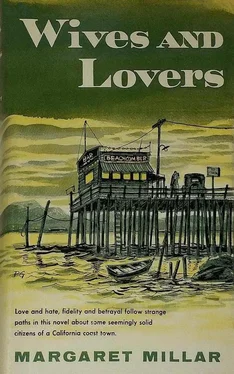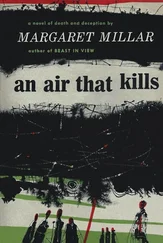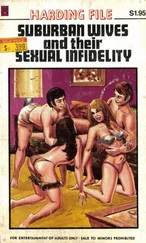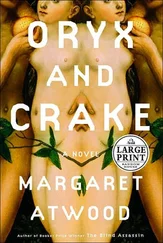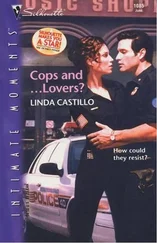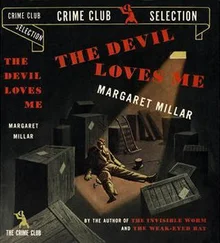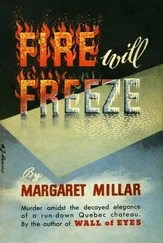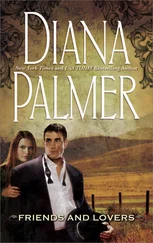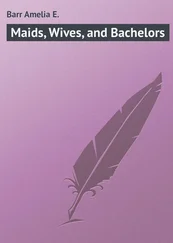“We’re staying together. God knows what she’ll do. I’m hoping she’ll get a divorce. I’m hoping she’ll realize when I’m gone that that’s what she’s wanted all along.” He got to his feet. His head felt heavy and brittle, and for a minute he could see nothing but blackness shot with flashes of light. But his physical discomfort merely accentuated the peace in his mind. Elaine had freed him. She didn’t intend to, but she had, and now he was free. He said, “We’ll drive over to my office for some clothes and then we’ll have breakfast, I’ll bring you back here and you can pack your things while I’m trying to gather together some money.”
“I haven’t much to pack.”
“More than I have.” He glanced down at her, smiling at her earnestness. He would have liked to bend over and kiss her but he was afraid his head might split in two. He put his hands on her shoulders. “We’ll never come back to this town, Ruby.”
“We’ll have to. This is where your work is.”
“I’ll sell my practice and start another one, wherever you want to go.”
“I’ll help you,” she said. “I’ll work hard.”
“We’ll start all over. I hate this town, I never want to see it again.”
She stared up at him, thinking, he will never love me the way I do him, I am looking forward just to being with him, and he’s looking forward to getting away from Elaine — not the town, he doesn’t hate the town, it’s just that she’s in it. But it doesn’t matter. I’m lucky and I’m tough.
She turned away and began to fold the blankets on the couch. A desert wind had began to blow over the mountains in the middle of the night and the blankets felt dry and dusty. Everything in the house was covered with a film of powdered sand, and there was a rawness in Ruby’s throat and nasal passages.
When they went outside the wind was still blowing, warm and furious. Gordon’s car was gray with dust, and still the dirt came spinning along the road. The houses trembled, as if a procession of freight cars was lunging up the tracks.
The keys were in the car.
“It’s a nice day to get out of town,” Gordon said.
They drove to his office and Ruby waited in the car while he went inside. It was quite a while before he returned, wearing the gabardine slacks and shirt that he kept for golfing. He looked very stern when he got back into the car.
“Gordon, you’re sorry to be leaving?”
“No,” he said quietly. “I was just looking around for the last time. Sentimental, isn’t it? I’m not sorry I’m leaving. I would just like to take some things with me. It’s funny how you can get attached to an electric machine. Habit, ownership.”
“You don’t have to sell your practice, Gordon. Couldn’t we just go away for a while and then we could come back and you could start to work just where you left off?”
“That’s the hard way.”
“Why? You haven’t tried it. People in this day and age don’t look down on a man for living with a woman.”
“An insurance man, maybe not, or a truck driver. But a schoolteacher, a doctor, a dentist — it’s not enough to be able to teach or perform an operation or fill a tooth. We have to set an example. This isn’t L.A. or Hollywood, Ruby. They’re a hundred miles and fifty million light years away. My ability to fill teeth isn’t half as important as my morals.” He shook his head. “No, I couldn’t swing it, I’m too soft. It would hurt me if they said, ‘I certainly will not pay him any five dollars for cleaning my teeth just so he can spend it on that woman he’s living with.’ Don’t look surprised. People are funny, they’re pretty hard on people who do some of the things they themselves would like to do. So what I’d get if I stayed here is just that — unpaid bills, patients who want a bargain because they figure I couldn’t afford not to cut my prices, and maybe a few new patients who believe that any dentist who lives in sin should be willing to sell drugs on the side. No, I couldn’t face it.”
He added, after a time, “I don’t dare hope she’ll divorce me. She doesn’t believe in divorce, but there’s a chance, maybe, if she can come to believe that it would be better for her, too. It would be, of course. She’ll never be happy living only to spite me. It’s funny about Elaine. I think that if she’d never married me she’d have been all right. She wouldn’t be so filled with vengeance and petty spite. Maybe even yet she will have some kind of decent life with a little softness in it.” A gust of wind blew a piece of newspaper against the windshield. It shivered there for a minute and then lurched wildly off down the street. “Where would you like to have breakfast?”
“Any place that’s open,” Ruby said.
They drove down Main Street. The sun had already risen and in the distance they saw the sheen of the ocean. But the town looked dead, parched by the hot wind. Along the curb were abandoned cars under a pall of dust. Two women were hurrying across the street heading into the wind, shielding their eyes with their hands. An old man sat on a bench at a bus stop, like a victim resigned to the sacrifice, his legs apart, his lunch pail resting on his stomach, his head thrown back with his neck ready for the knife. The old man moved, coughed, spat into the gutter. A cardboard box rolled down the sidewalk and a piece of ripped awning flapped against a store window. A painted sign swung in the wind, squeaking on its hinges. The supple palm trees leaned to the ocean, their fronds streaming out like seaweed, and the air was filled with a continuous rustling noise.
It wasn’t a very high wind, like the wind that came in from the ocean and blew the fog off the top of the mountains and cluttered the beaches with kelp and stranded starfish and pieces of tar from the underwater oil wells. Gordon liked the sea winds, they were natural, they suited the town. But the desert wind was an intruder, an alien from the other side of the mountain. Sometimes it hung around for days, like an unwelcome guest in the house who produced tension but must be tolerated. Gordon felt the tension in his hands as they gripped the steering wheel, and in his throat which seemed swollen and grimy.
Yet he was grateful to the wind, too. It was a good day to be leaving, a day when the town looked unnatural, squalid, hidden under scurf. He let his mind dwell, deliberately, on the things he didn’t like in the town. Over on Gioconda Street, where the highway bisected the town, lay the nucleus of the slum section. Here lived the Negroes, the Mexicans, and the remnants of what had once been a large Chinese community, in sagging shacks and chicken houses and barns. These slums were worse than anything he had ever seen even in the large cities. If they had existed in Chicago or New York, at least some attention might have been drawn to them, but here they were ignored. The rickety children played in the dirt on Gioconda Street and went to school when they had clothes and shoes to wear, or to the General Hospital if they got sick enough. The town bulged with doctors and elaborate clinics, but many of the residents of the slums felt that it was easier to die than to make the long trek out to the General Hospital and wait all day for a turn, only to be told to eat more eggs and T-bone steaks, take a long rest free from worry, go to Arizona, wear a custom-made truss, buy contraceptives, take vitamin pills. Every Saturday morning they came to Gordon’s office for free dental treatment and Gordon had come to dread this day in the week because he, too, had to give them impossible advice: If you could try to keep Susie off carbohydrates, Mrs. Haley. Sure, sure, Doc. Say, I still got this awful pain in my side and I been told I oughta have an operation on my insides but I got my cleaning jobs to do, I can’t take no time off with all those mouths to feed.
Читать дальше
